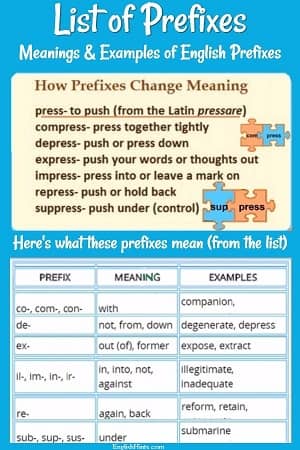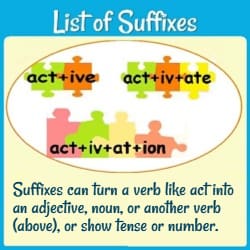List of Prefixes:
Learn New Words Faster
Recognize hundreds of English words with this list of prefixes (along with some common roots and suffixes.) Practice a few prefixes every day-- with a new root every week or two. Your English vocabulary will take off!
Important Notes about Prefixes

(Click here to go straight to the prefix list and save the explanations for later and here for links to more prefix examples and practice.)
1. There are often several prefixes with the same meaning. One may come from Latin and one from Greek.
Sometimes there's also an Anglo-Saxon prefix. (See sub- and hypo-, along with 'under-'.)
Often-- but not always-- they are used with a root from the same language.
So we have ‘synthesis’ originally from Greek and ‘composite’ from Latin. They both combine a prefix meaning ‘with’ and the idea of setting something down.
Prefixes and roots don't have to match. 'Hyper,' (‘over’ or ‘excessive’ in Greek) can be combined with ‘active,’ from Latin. They make the common English word 'hyperactive.'
See Common Greek and Latin Prefixes to compare these and other prefixes in alphabetical order by English meanings. (See also Greek Roots. Many words there can also be used as prefixes: bio-, photo-, tele-, etc.)
2. Prefixes commonly show
- size (macro, micro),
- quantity (mono, uni, bi, tri, quad, multi, poly),
- relationships (anti, contra, com, sym),
- position in time (ante, fore, pre, post)
- position in space (circum, exo, inter, intra, peri, sub, trans, etc.),
- quality (eu, mal), or
- negation. (See Negative Prefix List for more.)
3. Several prefixes have more than one form. That's usually because a different ending sounds better before certain letters. These include
- a- or an-, ad- (which often drops the ‘d’ and may double the consonant of the root word);
- co-, com-, or con-;
- il-, im-, in-, ir;
- pre- or pro- (sometimes);
- sym-, syn-;
- and sometimes others, like sub-.
4. There are many more commonly-used prefixes. I tried to limit this list of prefixes to the most useful of all, so it would be short enough to learn easily. (You can find more complete lists on the Internet or in a good dictionary.)
After you read the definition and the examples for each prefix, try to think of another word or two made from it. For example:
- anonymous-- without a (known) name,
- abduct-- to “lead away” (move your arm or leg away from the body, or to kidnap someone from their home),
- adhesive, adjust or administer...
Some prefix meanings will be obvious. Others will make more sense as you learn more words. See 50 Word Roots from Latin for prefixes combined with the Latin verb mittere, and then with other useful roots.
There are many other prefix examples on the pages mentioned below the prefix list.
Some examples using words made with co-, com-, & con- to show how prefixes combine with roots to form words:
- coherence-- stick together
- collaborate-- work together
- compress—push together
- conclusion—closing with
- concurrent—along with, at the same time
- conference—bring together
- conformity—shaped together with
- consequences—what follows with (a choice or action)
- construction—built with
- contact—touching together
- convocation—called together
(See bottom of page for more information.*)
List of Prefixes: A-D
| PREFIX | MEANING | EXAMPLES |
|---|---|---|
| a-, an- | without, not | anesthetic, atheist |
| ab- | away, from | abject, abscess |
| ad-, a-, ac-, as- | to, toward | access, admit, assist |
| ante | before | antecedent, anterior |
| anti- | against | antibiotics, antioxidant |
| auto- | self | autoimmune, autonomous |
| ben- | good | benefit, benign |
| bi- | two, both | bifocals, bipolar |
| circum- | around | circumference, circumscribe |
| co-, com-, con- | with, together | companion, concurrent* |
| contra-, counter- | against | contradict, counteract |
| de- | down, not, undo* | degenerate, depress |
| di-, dis- | lack of, not, apart | disadvantage, displacement |
Prefixes E-M
| eu- | good, normal | eugenics, eulogy |
| ex- (or e-) | out (of), former | expose, extract |
| exo-, ecto-, extra-, extro- | outside | exoskeleton, extraordinary |
| fore- | before | foresee, foreshadow |
| hemi- | half | hemisphere |
| hyper | above, excessive | hyperactive, hypertension |
| hypo- | under, insufficient | hypodermic, hypothetical |
| il-, im-, in-, ir- | in, into, not, against | illegitimate, inadequate |
| inter- | among. between | interpose, intervene |
| intra- | within | intramural, intravenous |
| macro- | large | macrobiotic, macrocosm |
| mal- | bad | malfunction, malignant |
| micro- | small | microbe, microscope |
| mis- | wrong | misfortune, mistake |
| mono- | one | monolingual, monopoly |
| multi- | many | multiple, multitask |
Prefixes: N-U
| non- | not, lacking | nonfat, nonsense |
| ob-,o-, oc-, op- | against, in front of, over, toward* | object, occur, omit, oppose |
| omni- | all | omnipotent, omnivorous |
| over- | too much, general | overall, overdone, overview |
| peri- | around | peripheral, periscope |
| poly- | many | polygamous, polygon |
| post- | after | postgraduate, postpone |
| pre- | before | precede, predict, prevent |
| pro- | forward | progress, promotion |
| quad- | four | quadriplegic, quadrangle |
| re- | again, back | reform, retain, regenerate |
| semi- | half, partially | semiannual, semiconscious |
| sub-, sup-, sus- | under | submarine, subtropical |
| super-, supra- | above, excessive | superlative, suprarenal |
| sym-, syn- | with, together | sympathy, synthetic |
| trans- | across, beyond | Transform, transportation |
| tri- | three | tricycle, triple |
| ultra- | beyond. excessive | ultraliberal, ultrasonic |
| un- | not | undeserved, unhappy |
| uni- | one | uniform, unilateral |
* ob- (& sometimes de-) can also intensify the meaning of a root-- make it stronger.
You can download this table, with lots of practice+, as an inexpensive pdf for classes on Root, Prefix, and Suffix Worksheets. You can also get the prefix table and negative prefix list by themselves from the student version of that page, below the prefix packet.
More Prefix Examples & Practice
Practice prefixes at 8+ Common Prefixes, The Prefix 'Re', or Practice Negative Prefixes. These pages also give you many examples of each prefix. (There are almost 50 prefix examples on the Common Prefixes page alone.)
The practice exercises show ways to use them in sentences.
The Negative Prefix List explains the differences between common negative prefixes. It also provides lots of examples.
Word Families shows you how these prefixes change one word family (act). 50 Latin Word Roots shows how prefixes combine with many roots. (It gives a complete demonstration using one root.)
You might also like English Word Origins, List of Suffixes, or Important Latin Roots.
*More on Words with Co-, Com-, or Con-
You can find more complete explanations of the examples in the yellow box (& other words from those roots) on
(as well as several other practice pages linked from them.)
More examples of words with co-, com-, or con- on those pages: colleagues, commit, commotion, compelling, complicated, compulsive, concise, conduct, confined, confirmed, conflict, confusing, conjunction, conservation, consistent, constitutional, contain, contentious, contract, contribution, convene, convert, cooperation, coordination, corruption.
You Might Also Like:
The explanations & examples in this negative prefix list can help you use them without confusion.
Use this list of suffixes (with examples) to build your vocabulary.
Knowing a few roots & prefixes can help you figure out meanings of new words.
Didn't find what you
needed? Explain what you want in the search box below.
(For example, cognates, past tense practice, or 'get along with.') Click to see the related pages on EnglishHints.
| site search by freefind | advanced |










